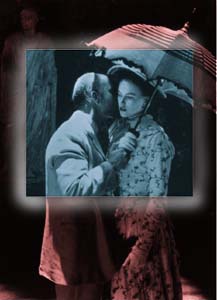![[MetroActive Movies]](/movies/gifs/movies468.gif)
![[MetroActive Movies]](/movies/gifs/movies468.gif)
[ Movies Index | Metro Santa Cruz | MetroActive Central | Archives ]
Snapshot of a Lady
Literary sequelist Julia Barrett considers Jane Campion's film version of Henry James' classic protofeminist novel
By David Templeton
'OH, YOU DIDN'T!" cries author Julia Barrett upon hearing that I missed the first five minutes of Jane Campion's film The Portrait of a Lady. "You missed the whole opening? I thought it was so pertinent to the film!"
I have phoned Barrett at her home in Santa Monica, having previously arranged this long-distance tête-a-tête to discuss the much-talked-about screen adaptation of Henry James' 116-year-old, protofeminist novel. Now, having sheepishly confessed my faux pas, I invite Barrett to fill me in on what I missed.
"Campion begins with all of these shots of women--young, of course--and they are absolutely casual, strictly contemporary," Barrett explains. "They are 'free women,' so to speak, without makeup, with free hair, braided hair, whatever. And then she cuts to the face of Nicole Kidman [as James' heroine, Isabel Archer], whose hair is done up in very proper style, and the costume is so very binding. And the story begins.
"So," Barrett pronounces, "That's what you missed!"
And its pertinence to the film?
"Well, I thought that Jane Campion was making a statement about women's freedom," she replies. "She's making a contrast between where we are now, and where they were then. I think she's saying, 'This picture is about freedom.'
Sort of a "We've-come-a-long-way-baby" kind of thing?
"Oh! Well," Barrett laughs, "that's the very phrase I came up with, but I thought it was too coarse to use."
The movie The Portrait of a Lady arrives on a tide of heightened public interest in literary works, evidenced by the recent spate of Shakespeare films and all those Jane Austen movies and Austen-inspired books.
Barrett herself has benefited from this swing toward the classics, having authored two audacious--and very well-received--sequels to Austen novels. Presumption: An Entertainment (University of Chicago Press, 1993) continues where Pride and Prejudice left off, and Barrett's latest, the delightfully spot-on, The Third Sister (Donald I. Fine, 1996), is a continuation of Sense and Sensibility. Though occasionally taken to task for her bold appropriation of Austen's work, Barrett's books are nevertheless widely praised for their accuracy in affectionately parroting the great author's vigorous wit and lyricism.
"I'm sure you are aware that Henry James was a great admirer of Jane Austen," Barrett says. "He thought that she was the very master of style." As to James' own style, Barrett is equally enamored.
"It's remarkable," she enthuses. "It's crisp and witty. It's reminiscent of everything, stylistically, that I care about."
In Portrait, considered by many to be the greatest novel ever written in English, James tells of young Isabel's quest for a free and unconventional life, a dream that is thwarted by her marriage to an opportunistic monster.
"I have taken the opportunity to look it over again," Barrett says, to the accompaniment of riffling pages. "It's always a marvelous read." As for the film, though she appreciated the attempt, she felt that Campion took too many liberties with the original material, obscuring the motives that powered Isabel's actions.
"She's looking for love, of course, and that does come through," Barrett explains. "But she's also looking for connection. 'Connection' was James' word, you know. Like many of the heroines in James, she was in search of cultivation. She wanted everything the world had to offer. She wanted learning, understanding, comprehension. I don't think that was made very clear in the film.
"The other thing is that Casper Goodwood [her unrelenting suitor] is not done right. Being that he was an American, James deplored him. He was a businessman. In the book, he had a very pompous nature. But that wasn't represented by the lovely young man in the movie, was it?"
"It is certainly a daunting prospect, to adapt this novel to the screen," Barrett continues. "Isabel Archer's aims in life are difficult to illustrate on the screen--to get you to understand what she is looking for without the subtlety of words. I read a piece in last week's New York Times, where the question is raised as to whether it should have been done at all. As much as I wish it had been a better film, I can't go with the argument that the literary classics shouldn't be made into movies. I think that we are willing to put up with a great deal to see the books we love turned into visuals, and to get the words out, to hear them spoken aloud."
In fact, Barrett admits that she looks forward to future screen versions of other James works.
"James writes heroines that I care about, that live for me," she says, almost purring. "And his writing is so beautiful. May I read you something?"
She chooses the deathbed speech of Isabel's cousin, Ralph, and reads, "You wanted to look at life for yourself, but you were not allowed. You were punished for your wish. You were ground in the very mill of the conventional."
Suitably moved, I repeat those last words aloud: "Ground in the very mill of the conventional."
"That's Henry James," Barrett concludes.
This page was designed and created by the Boulevards team.

Finger on Henry's Pulse: Literati such as Julia Barrett think Campion's film doesn't do justice to James' prose.
Metro Santa Cruz writer David Templeton takes interesting people to interesting movies in his ongoing quest for the ultimate post-film conversation. This time, he sends author Julia Barrett to see the controversial screen adaptation of Henry James' Portrait of a Lady.
From the February 6-12, 1997 issue of Metro Santa Cruz
Copyright © 1997 Metro Publishing, Inc.